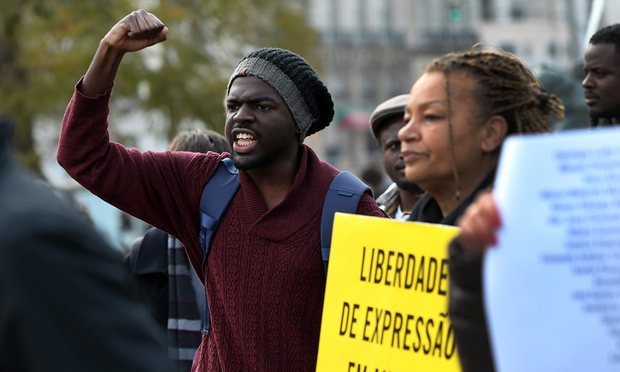PBS: Escaping Eritrea … [Read More...] about ካብ ውሽጢ ቤት ማእሰርታት ኤርትራ
D Quaresma Dos Santos |
"We don't take sides; we help you see more sides."

Published:
PBS: Escaping Eritrea … [Read More...] about ካብ ውሽጢ ቤት ማእሰርታት ኤርትራ
D Quaresma Dos Santos |
Angola’s government has approved a set of laws which hand control and regulation of all media to a new body run by the ruling party.

The Angolan Social Communications Regulatory Bodywill also have broad powers to “enforce compliance with professional journalistic ethics and standards” and “verify compliance by radio and television operators”.
It will also decide which journalists are eligible for press accreditation.
The president warned that he was planning to crack down on social media in December. José Eduardo dos Santos, who has ruled Angola since 1979, said “social networks should not be used to violate other people’s rights, humiliate, slander or convey degrading or morally offensive content.”
He added that “the country must adopt as soon as possible adequate legislation” to regulate unacceptable social media practices.
Fulfilling his promise, the laws have been passed shortly before the ruling party national congress later this month, but critics say the new body will merely cement the MPLA’s ability to silence journalists and restrict the press.
Rafael Marques de Morais, a prominent regime critic who was imprisoned for a series of articles he wrote about the president, said the ruling party is hoping to “control and censor any attempt by political activists to use social media and the internet to blow the whistle on the most egregious examples of corruption, nepotism and the abuse of power.”
The laws will also give officials and agents of the regulator power to raid the office or home of any person or organisation thought to be publishing information, online or elsewhere.
For many Angolans, this authoritarian shift is nothing new. In March a court jailed 17 young activists, some for more than eight years, for “rebelling” against the government of José Eduardo dos Santos after they organised a reading of a US academic’s book.
Last year, a prominent human rights activist, José Marcos Mavungo, was sentenced to six years in prison for an “attack on the sovereignty of the Angolan state” after he organised anti-government protests in the northern oil region of Cabinda.
Human rights groups have accused Dos Santos of using the judiciary to crush dissent, and Angola’s state secretary for human rights admitted last year the country needed to restore trust in its justice system.
Dos Santos has been in power for 37 years but announced in March that he planned to step down in 2018.